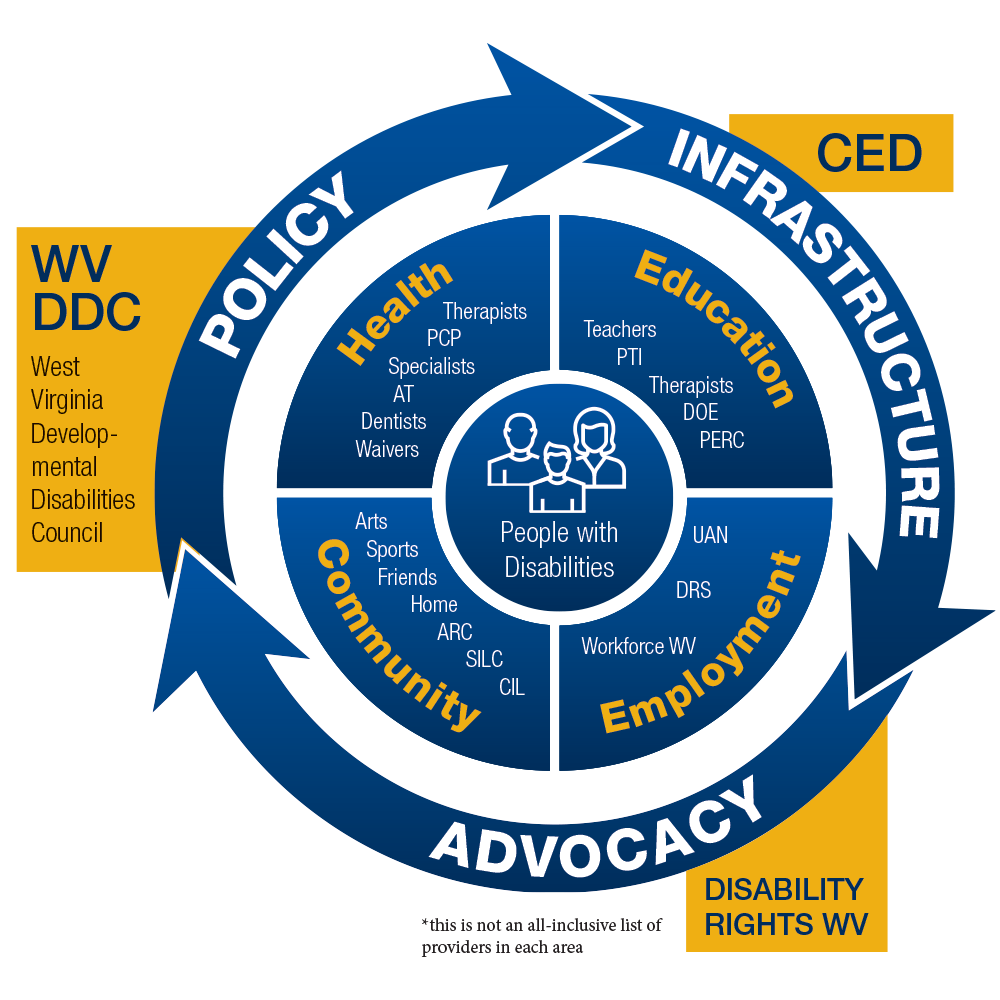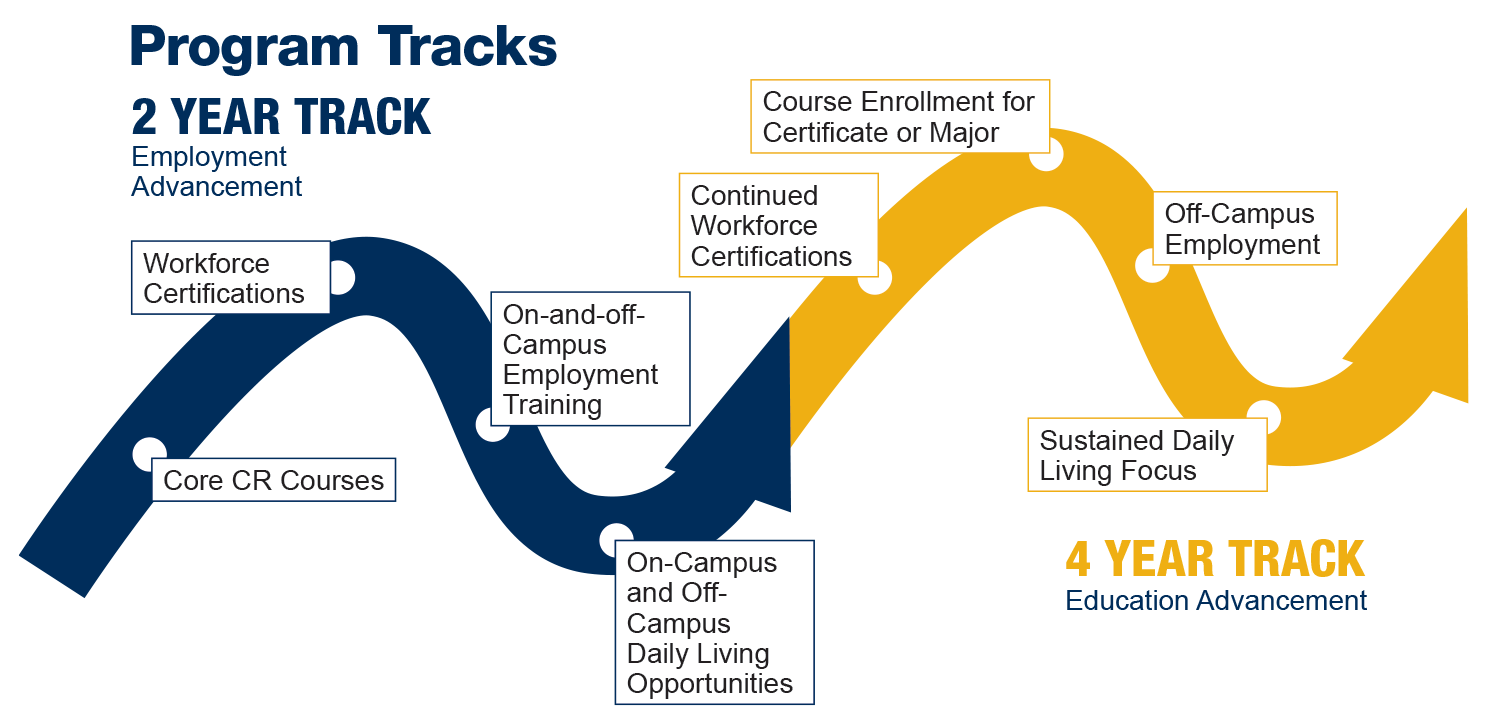2020-2021 Annual Report
Association of University Centers on Disability
- Education
- Research
- Service
- Dissemination

People with Disabilities
Professionals
Community
Policy Makers
The WVU CED is a part of a 62-site national AUCD network that works in collaboration with national, state, and local partners to support people with disabilities through EDUCATION, RESEARCH, SERVICE AND DISSEMINATION.
Service to Our State
Service to West Virginia (WV) is key to our mission at the WVU CED. We recognize that front line, local organizations contribute to the network of direct services to clients, so we work hard to build their capacity, coordinate efforts, reduce duplication, and to provide the best evidence-based services and supports to West Virginians with disabilities and their families. The WVU CED established four areas of emphasis to base their work over the past five years. Those areas include: access to quality health care, employment, health and wellness, and transitions.
Across all center programming,
62,503
individuals received at least one form of service in 2020-2021.
The service map provides us with several take home messages for our WVU CED team and those we serve.
First, there are several counties in the state that receive a high concentration of services each year. These include Monongalia and Kanawha counties but also Wood and Cabell counties. Much of our work has been implemented to coordinate services and reduce duplication. Many disability providers are found in these larger cities within the state and reflect that effort.
Secondly, we have attempted to expand our services to most (if not all) counties of the state. During this period, we provided services to 11 new counties. We have also successfully increased the number of services that are provided throughout the state to 999 this past year.

WV DD Network
In every state and territory, programs authorized by the Developmental Disabilities Assistance and Bill of Rights Act (DD Act) empower individuals with developmental disabilities and their families to help shape policies that impact them. DD Act programs conduct important research and test innovative new service delivery models. They work to bring the latest knowledge and resources to those who can put it to the best use, including self-advocates, families, service providers, and policymakers.
The CED, the WV Developmental Disabilities Council and Disability Rights WV represent the state’s Developmental Disability (DD) Network. Together, these agencies help the state to develop and implement policies, infrastructure and advocacy efforts to follow plans created by the DD Act. This strong DD Network is able to serve more people collectively.
Core Function Highlights:
-

RESEARCH: Accountable Health Community (AHC) Project
This project is a CMS-funded randomized controlled trial to examine the benefits of providing patient navigation services to address social service needs. The purpose of the initiative is to provide a bridge of coordinated care that would link individuals’ medical homes with social service providers so that their social service needs are resolved, and they are able to respond to medical treatment and advice.
The WVU CED is coordinating these services using completed assessments of social service needs among individuals seeking medical treatment within the Partners in Health medical clinics.
The WVUCED Conducted 39 research activities
Learn more about research initiatives at research.cedwvu.org/
-

TRAINING: Project SCOPE: Supporting Children of the Opioid Epidemic (SCOPE)
The WVU CED was awarded a national training grant to implement Project SCOPE. This training initiative is intended to identify and train practitioners in current and emerging knowledge and evidence-based promising practices in screening, monitoring, and care for children diagnosed with neonatal abstinence syndrome (NAS) or neonatal opiate withdrawal syndrome (NOWS), or who are suspected of being impacted by opioid use and related trauma exposure.
The WVUCED Conducted 246 trainings, with 9846 participants
Learn more about education and training at cedwvu.org/education/
-

DISSEMINATION: Team WV PPE Project
During the COVID-19 shut down, the WVU CED secured additional funding from Team for West Virginia’s Children to distribute PPE, educational materials about COVID-19 and vaccine information. The project partnered with the West Virginia Alliance of Family Resource Networks, Community Action Agencies and other individual community agencies to distribute 500+ PPE Kits to families who have individuals with a disability and at least one child in the home. The kits included easy to read educational materials about the importance of wearing a mask and social distancing and recipients were encouraged to participate in the social media campaign #CEDMaskChallenge to share their selfies wearing a mask.
The WVUCED Shared 35, 453 resource materials to 547, 832 people
-

DIRECT SERVICES: Expanded Service Delivery
LEND Director, Dr. Maggie Jaynes, led telehealth implementation at the CED and WVU Medicine Children’s Pediatric Subspecialty and Telehealth Clinic. Go Baby Go partnership gave 5 cars to children at no cost. Pay It Forward provided long-term loans of pediatric equipment to qualifying families.
The WVUCED Worked directly with 7,572 clients
Program Spotlight
WVU
Country Roads Program
WVU CED Launches Country Roads College Program for students with intellectual and developmental disabilities.
www.countryroads.cedwvu.org
The Country Roads Program first launched last year virtually and this fall welcomed six new students to campus. The program includes a two-year core track focused on independent-living skills and workforce preparedness, plus the option of an advanced track for an additional two years. In the first year, students live in an on-campus dorm, participate in social activities across campus, and gain academic and career preparation
Occupational Preparation, Independent Living Skills, Social Interaction

This document provides an overview of the WVU CED’s accomplishments in 2020-2021 within those select areas. If you have questions or need additional information, please contact Dr. Lesley Cottrell at lcottrell@hsc.wvu.edu.
